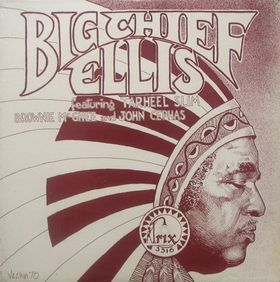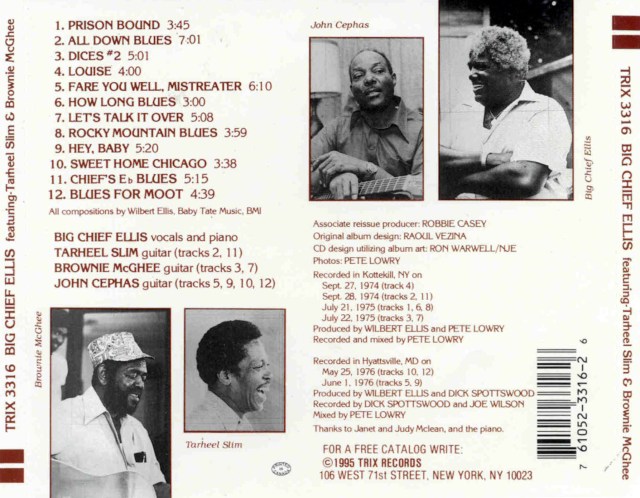3316: Big Chief Ellis – “Big Chief Ellis”
Those who seek after music often remind me of anthropologists. We rarely consider an area ripe for research unless it is geographically and culturally remote. How else to explain the fact that Wilbert (Big Chief) Ellis has lived amongst those of us in the New York and Washington, D.C. areas for many years with so little attention paid him? He is the legitimate heir of a long and honorable Alabama blues piano tradition. His friends and predecessors include men like Cow Cow Davenport, Pine Top Smith, Walter Roland, Jabo Williams, Vance (Piano Red) Patterson (who recorded) and Bubba Jack, Man Lewis, Goat, Hooky Doo, and Price Linnear (who didn’t). During his long, eventful life, Chief has been exposed to many styles of blues and other music, but, recognizing the beauty and importance of what he has, refused to allow alien influences creep into his thoughtful, emotional and carefully structured approach to the music he loves.
That love and respect is evident in each of the pieces included in his debut album, He is a sensitive and critical man, and each of these tunes was recorded several times in varying circumstances until he was satisfied with both technique and feeling, Although first-class guitarists like Alden (Tarheel Slim) Bunn, Brownie McGhee and John Cephas give strong backing in several of these selections, it is Chief himself who sets the deliberate pace, drawing attention to the lonesome sound of his piano and to the feeling he imparts to every song,
Ellis was born (in 1915) and raised in Birmingham, where he was absorbed with piano music from ‘the first. His parents were religious and allowed no music in their house. Chief circumvented the restriction by working out an arrangement with his great aunt, who owned a piano and who would allow him to practice every time he mowed her lawn. By the time his parents found out it was too late, for Chief was already a respected musician in the community. They relented, of course, and allowed their son to develop his music to its full potential.
Chief was a professional gambler for most of his adult life. This occupation allowed him to travel and provided occasions for him to learn from other musicians (notably Walter Davis in Chicago) and learn the many secrets which allowed him to survive and prosper in his precarious occupation. He settled in New York City in 1942 where he ran night clubs for several years and even became (after 1945) backup pianist on many record sessions. One of these, for Lenox in 1945, produced his own “Dices, Oh Dices”, which remains his signature piece. Oddly enough, this was the second recording of his own tune. Chief had performed it often while still living in Birmingham – it was picked up by Walter Roland, who recorded it in 1933, a full year ahead of the composer. Another significant recording was made during the late 40s, Stick McGhee’s “Drinking Wine Spo-Dee-O-Dee. This R&B bestseller had been composed previously by Chief while he was serving in the army at Ft. McClellan, Alabama. Wine was a favorite during periods of forced idleness. So much was consumed that Chief made up a little song about it, whose refrain began, “drinkin’ wine, motherfucker, drinkin’ wine”. A white record executive in New York heard it and purchased the song for a few dollars, making a hit for someone else. Stick McGhee was Brownie’s brother, and Chief and Brownie are both heard on the hit release.
The popularity of blues and blues-derived music declined in New York with the mass-marketing approach advanced by rock-and-roll in the fifties, and Chief virtually stopped playing. In 1974 I received a letter from Bob Eagle of Australia, whom Brownie McGhee him informed that Chief might be living in the Washington area. One phone call confirmed that this was so, and that I had introduced myself to a man who would become a close friend, as well as a musician whose power and depths I remain in awe of. Chief has discovered that people once again love and respond to his music and he is taking it to bars, clubs, festivals, concerts, and to the homes of his many friends. He is a huge, imposing man, with the gentle consideration and warmth common to the best of huge, imposing men. He pours love into his music the way that soft-drink company claims they do to their ginger ale. And now you too, lucky record buyer, have a chance to partake.
Richard K. Spottswood
======================================================================
I don’t remember now who lead me in the direction of Big Chief Ellis. . . either Tarheel Slim or Brownie McGhee. Anyway, I found myself one day in the early seventies in the liquor store he ran with his brother in D.C. We talked a while and hit it off well – so well that I bought a piano (an old Steinway upright)! Chief and his wife, Mootie, came up to Peg Leg Bates‘ Country Club in Kerhonksen, NY in the fall of ’74 on a bus trip sponsored by their church. The weather that weekend was bad, so Chief came over to my house (and piano) and recorded a few solo tunes. The weather still was bad on Sunday and I was able to get Tarheel Slim to come up from the Bronx: they backed each other on a large selection of songs (see also; TRIX 3310 – “No Time At All”; Tarheel Slim).
Talks with Brownie McGhee the next year led to him volunteering to play on a session with Chief. Chief was on another junket to Bates’ place and Brownie was in New York one weekend, so it actually happened – they even remade Chief’s signature song, “Dices, Dices”. A later visit with Chief in our nation’s capitol in ’76 led to an introduction to John Cephas, who I interviewed and recorded in some depth at Chief’s apartment. John and Chief had met a year before at a party and later formed a band that included a younger Phil Wiggins – John and Phil are now a major folk-blues duo. Dick Spottswood and Joe Wilson recorded Chief and John for me down there and from all those efforts, this album was put together.
Chief then decided that he had had enough of northern urban crime and he and his wife moved back to Birmingham. Norbert Hess was planning to get Chief to Europe in 1978 (the first Trix artist to be tapped for such a trip), but sadly that was not to be. In December of ’77, Wilbert Ellis passed away not long after returning “down home” and one of the last two-fisted Birmingham blues pianists was gone. This CD, Ellis’ only full-length release, shows his pianistic abilities, of course, (and gives you an idea why he was so in demand for session work in the early ’50s), but also gives free reign to his smoothly smokey singing. Chief was a superb artist and a friend, and I hope that you enjoy his art as much as I enjoyed recording it.
Peter B. Lowry (1995) CD release Cottekill, NY
————————————————————————————————————
Getting the likes of Brownie McGhee, and Tarheel Slim to record with Ellis was a coup for me… the former more than the latter. Slim was recording for me at the time (see Trix 3310) and that may have motivated that combination; Slim volunteered to come up the following day when I told him that Chief would be recording there. Brownie and I always had a good relationship and he found himself available in the NY area and volunteered to come up to my home in Ulster County for a session the next year. Brownie was always a professional, über alles, and more than willing to help his old friend. The session was very comfortable and went quickly.
Dick Spottswood and Joe Wilson had by that time sort of “taken on” Chief in DC – they recorded Ellis for me solo and with John Cephas, who Chief had hipped me to in early 1976 – I recorded John’s first session in Chief’s living room at the time! All this variety resulted in a sterling album – Chief was not a big boogie man, but was a strong blues player and super singer.
My last contacts with him before he went back to Birmingham, AL were at The Philadelphia Folk Festival. I had successfully gotten Chief, Tarheel Slim, and Peg Leg Sam (Trix 3302) on the bill. They all went down nicely solo and as a trio, and at the end I saw Chief off in his Caddy, taking Sam with him to DC. He enjoyed playing music and would have gone to Europe after that had he not died not long after going back “home” to Alabama.
……………………………………………………………………………………………………………………………………….
The twelve pieces on this album were taken from six recording sessions over three years (1974-1976) – the first four were done at my “home studio” in Cottekill, NY, while the last two were done at the home of Joe Wilson in Hyattsville, MD.
For more on Big Chief Ellis, see O&S #19.
Peter B. Lowry (2012) Sydney



Pingback: Big Road Blues Show 1/31/16: Alabama Boogie – Post-War Alabama Blues | Big Road Blues
Pingback: Big Road Blues Show 11/18/18: I Get Evil When My Love Comes Down – New York Downhome Blues Pt. 1 « Big Road Blues
Pingback: Big Road Blues Show 11/25/18: Creepin’ Blues – New York Downhome Blues Pt. 2 « Big Road Blues
Pingback: Big Road Blues Show 12/2/18: Rub A Little Boogie – New York Downhome Blues Pt. 3 « Big Road Blues
Pingback: Big Road Blues Show 5/10/20: The Road Is Rough And Rocky – Washington DC Blues Pt. 1 | Big Road Blues
Pingback: Big Road Blues Show 5/17/20: Goin' Down The Road Feelin' Bad – Washington DC Blues Pt. 2 | Big Road Blues